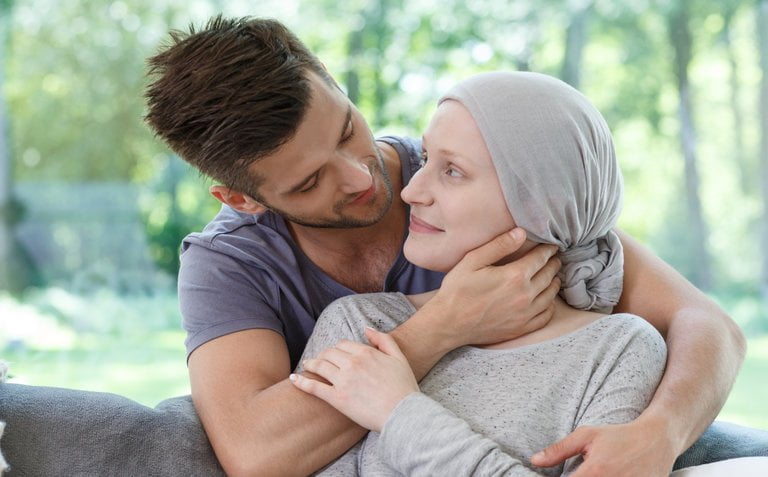
At diagnosis, quite a few cancer patients spy Eros rushing out the door. I know I did. For some, eroticism vanishes during or after treatment. Anhedonia, the inability to feel pleasure, can afflict both men and women with cancer. We often get more help from one another than from the medical specialists who are beginning to address this challenge.
It can be difficult to experience desire if you don’t love but fear your body or if you cannot recognize it as your own. Surgical scars, lost body parts and hair, chemically induced fatigue, radiological burns, nausea, hormone-blocking medications, numbness from neuropathies, weight gain or loss, and anxiety hardly function as aphrodisiacs. At 46, the youngest member of my cancer support group put it best: “an existential crisis is not sexy.” Although her physicians offered no advice, she eventually attempted to foster a renewed sex life, if only for the caring partner who saw her through treatment.
“Sex and Cancer,” a new book by Dr. Saketh R. Guntupalli, a gynecologic cancer specialist, and Maryann Karinch, sets out to help women with gynecologic or breast cancer. Dr. Guntupalli and Ms. Karinch labor mightily to provide scientific evidence for an insight some might consider predictable: “We found that sex was less pleasurable for women after cancer and that all types of sexual activity — oral, vaginal and anal — decreased after cancer.” In patches of ponderous prose, their book describes the ways in which treatment inhibits romance.
More informative are the sections of “Sex and Cancer” in which the authors explain what people can do to ensure that “the emperor of all maladies” will not rule and wreck their relationships. First and foremost, Dr. Guntupalli and Ms. Karinch urge readers not to “slap a ‘dysfunction’ label on your love life just because you read something about what is ‘normal’ or ‘average.’” This is precisely the advice that prostate cancer patients also receive in self-help manuals.
The capacious term “sex” should not be conflated with penetration or intercourse, according to Dr. Guntupalli and Ms. Karinch. “There is no dysfunction if both members of the couple are happy with the level and style of intimacy they enjoy.” Kissing, hand-holding, cuddling, caressing and massaging bond couples by kindling arousal and ardor. The authors do not mention the useful word “frottage” which comes from the French for rubbing or friction; it neatly bundles together many forms of stimulation that prompt tenderness and excitement.
With a therapist or on their own, partners can try “sensate focus exercises” that involve them in exploratory touching without the pressure to achieve a goal like orgasm. Pelvic floor exercises, vibrators, techniques for dealing with scar tissue and restricted range of motion, dilators as well as lubricants: Dr. Guntupalli and Ms. Karinch tackle these specifics to encourage survivors to redefine sex after cancer as a sensual source of delight in a range of activities.
To illustrate this point, they tell the story of Allis, a 49-year-old ovarian cancer patient who undergoes “a total pelvic exenteration” (the surgical removal of the bladder, urethra, rectum, anus, vagina and cervix). She awakens with a permanent colostomy and a urinary diversion. She must wear two bags to collect feces and urine. To her dismay, gone are her cute thongs, replaced by granny panties. She buys an ostomy belt (to protect and hide the bags) as well as a black negligee.
But she sobs when her husband’s embraces bring home the realization that there is “no way to have normal sex.” After he reassures her that they can be creative, they begin getting ideas by visiting what she calls “naughty stores” and then exploring every possible way to enjoy themselves together.
Not facing such extreme physiological impairments, the youngest member of my support group nevertheless found herself “less easily aroused and less orgasmic.” Her explanation of how she cultivated “the art of desire” strikes me as illuminating for women and also for men.
She uses exercise to appreciate her body’s tremendous resilience; acknowledges that she is anatomically, psychologically and hormonally changed; experiments with solo sex and also extended foreplay with her partner; and samples the shared stimulation of movies, concerts and travels to create a sense of closeness. Since her marital bed had been her sick bed, she refurbished the bedroom with sensory stimulants. It now promotes joy in her partner’s life and in hers as well.
When Eros disappears, books and conversations can help couples prepare to welcome the god’s return. As the poet Marianne Moore once put it, in an entirely different context, “Whatever the problem, we must elude the sense of being trapped — even if all one can say to one’s self is, ‘if not now, later.’” For many people, better later than never.
Yet this is not the case for everyone, I realized when my contemporary and fellow academic Nancy K. Miller responded to my request for input on the issue of sex after cancer. In her 70s, she has, like me, managed the disease for years. With precisely the exasperation I associate with the intimacy I crave, she shot back, “You expect me to remember sex?” My laughter was a total turn on, as I bathed in the bliss of cherishing my friend’s candor.
Source:-nytimes
